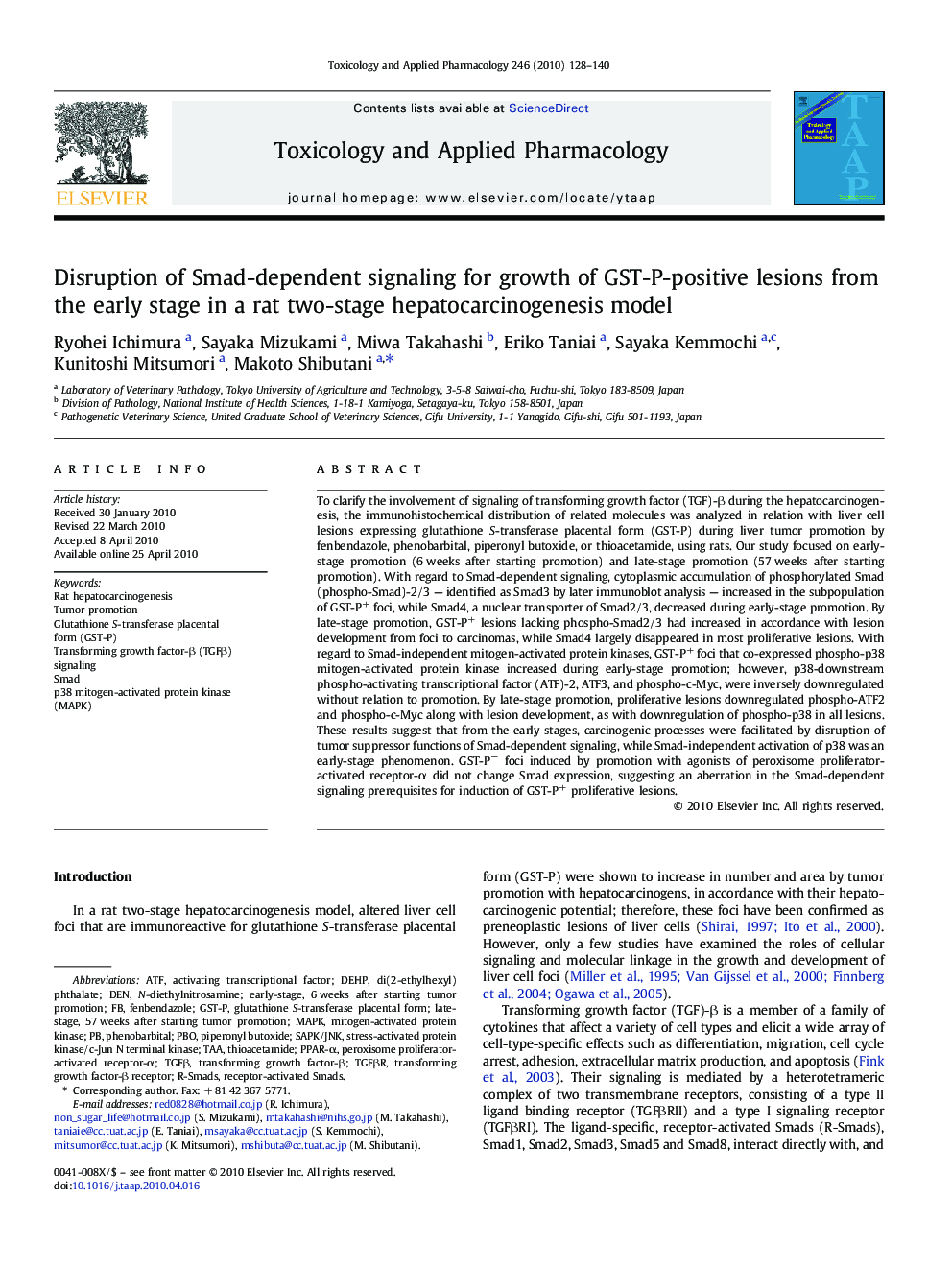| کد مقاله | کد نشریه | سال انتشار | مقاله انگلیسی | نسخه تمام متن |
|---|---|---|---|---|
| 2569822 | 1128553 | 2010 | 13 صفحه PDF | دانلود رایگان |
عنوان انگلیسی مقاله ISI
Disruption of Smad-dependent signaling for growth of GST-P-positive lesions from the early stage in a rat two-stage hepatocarcinogenesis model
دانلود مقاله + سفارش ترجمه
دانلود مقاله ISI انگلیسی
رایگان برای ایرانیان
کلمات کلیدی
Rat hepatocarcinogenesisPiperonyl butoxideN-diethylnitrosamineGST-PR-SmadsSMADPPAR-αPBOactivating transcriptional factorDenReceptor-activated SmadsDEHPTGFβATFTGFβRTAAMAPK - MAPKSAPK/JNK - SAPK / JNKTumor promotion - ارتقاء تومورtransforming growth factor-β - تبدیل فاکتور رشد βtransforming growth factor-β receptor - تبدیل کننده گیرنده رشد فاکتور βThioacetamide - تیوات آمیدdi(2-ethylhexyl) phthalate - دی (2-اتیل هگزیل) فتالاتglutathione S-transferase placental form - فرم جفتی گلوتاتیون S-transferasePhenobarbital - فنوباربیتالEarly-stage - مرحله اولیهperoxisome proliferator-activated receptor-α - پراکسیزوم پرولیفراتور فعال گیرنده -αmitogen-activated protein kinase - پروتئین کیناز فعال با mitogenp38 mitogen-activated protein kinase (MAPK) - پروتئین کیناز فعال میتوژنز P38 (MAPK)fenbendazole - پنبندازول
موضوعات مرتبط
علوم زیستی و بیوفناوری
علوم محیط زیست
بهداشت، سم شناسی و جهش زایی
پیش نمایش صفحه اول مقاله

چکیده انگلیسی
To clarify the involvement of signaling of transforming growth factor (TGF)-β during the hepatocarcinogenesis, the immunohistochemical distribution of related molecules was analyzed in relation with liver cell lesions expressing glutathione S-transferase placental form (GST-P) during liver tumor promotion by fenbendazole, phenobarbital, piperonyl butoxide, or thioacetamide, using rats. Our study focused on early-stage promotion (6 weeks after starting promotion) and late-stage promotion (57 weeks after starting promotion). With regard to Smad-dependent signaling, cytoplasmic accumulation of phosphorylated Smad (phospho-Smad)-2/3 - identified as Smad3 by later immunoblot analysis - increased in the subpopulation of GST-P+ foci, while Smad4, a nuclear transporter of Smad2/3, decreased during early-stage promotion. By late-stage promotion, GST-P+ lesions lacking phospho-Smad2/3 had increased in accordance with lesion development from foci to carcinomas, while Smad4 largely disappeared in most proliferative lesions. With regard to Smad-independent mitogen-activated protein kinases, GST-P+ foci that co-expressed phospho-p38 mitogen-activated protein kinase increased during early-stage promotion; however, p38-downstream phospho-activating transcriptional factor (ATF)-2, ATF3, and phospho-c-Myc, were inversely downregulated without relation to promotion. By late-stage promotion, proliferative lesions downregulated phospho-ATF2 and phospho-c-Myc along with lesion development, as with downregulation of phospho-p38 in all lesions. These results suggest that from the early stages, carcinogenic processes were facilitated by disruption of tumor suppressor functions of Smad-dependent signaling, while Smad-independent activation of p38 was an early-stage phenomenon. GST-Pâ foci induced by promotion with agonists of peroxisome proliferator-activated receptor-α did not change Smad expression, suggesting an aberration in the Smad-dependent signaling prerequisites for induction of GST-P+ proliferative lesions.
ناشر
Database: Elsevier - ScienceDirect (ساینس دایرکت)
Journal: Toxicology and Applied Pharmacology - Volume 246, Issue 3, 1 August 2010, Pages 128-140
Journal: Toxicology and Applied Pharmacology - Volume 246, Issue 3, 1 August 2010, Pages 128-140
نویسندگان
Ryohei Ichimura, Sayaka Mizukami, Miwa Takahashi, Eriko Taniai, Sayaka Kemmochi, Kunitoshi Mitsumori, Makoto Shibutani,